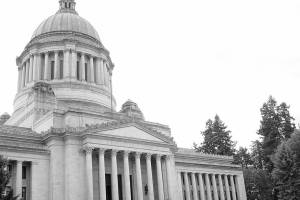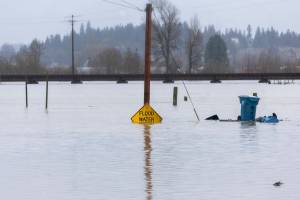Alaska Chamber of Commerce visits Tacoma
Published 12:00 am Wednesday, June 5, 2002
Highlighting the close economic ties between the 49th state and the South Sound, representatives of the Alaska State Chamber of Commerce made their annual visit to the Puget Sound region, stopping in Tacoma yesterday for a networking luncheon.
Hosted by the Tacoma-Pierce County Chamber of Commerce, civic and business leaders of Alaska and Tacoma enjoyed a seafood lunch hosted by Newly Weds Foods at the firms warehouse in the Lakewood Industrial Park.
Chicago-based Newly Weds Foods – the name is a reference to how well the firms first product, an ice cream and cake roll, went together – specializes in the manufacturing of food seasonings, and sends a lot of its product to Alaska.
Tacoma officials briefed their Alaskan guests on the citys marketing plans, focusing on the recent Wired City campaign designed to lure businesses from the Seattle area.
Marketing of a city like this is a long term project, perhaps 8-to-10 years, said Bill Bouge, business information services manager for Tacoma. Weve got a lot to offer.
Lower office space costs, guaranteed building permits within eight weeks and shorter commute times, are what Tacoma offers over its big city neighbor to the north, said Dan Voelpel, Tacoma communications supervisor.
Alaska Chamber President Pamela La Bolle introduced members of the Alaska State Chamber of Commerce Executive Board to brief those in attendance on the state of the Alaskan economy and its effects on the Pacific Northwest.
This is an excellent opportunity to get to know our partners in this part of the country, said Helvi Sandvik, chair of the Alaska Chamber.
She is president of NANA Development Corporation in Anchorage.
This is an educational opportunity for us, Sandvik noted.
The outlook for the economy in Alaska is uncertain, said Ted Quinn, chair-elect of the Alaska Chamber.
Quinn, president of Capital Office Systems/Supply in Juneau, pointed out the oil, fishing and timber industries are all in decline in Alaska, and that the state is facing a $1 billion budget shortfall.
We dont want this gap filled by businesses, he said, referencing the recent publicity over a proposed luxury tax on coffee in Seattle.
There are certainly some interesting times ahead for Alaska, he said.
Alaska Chamber Vice Chair David Marquez detailed the decline of the oil and gas industries, which provides about 80 percent of the revenue of Alaskas $24-26 billion budget.
Marquez is an Anchorage attorney with the Veco Corporation.
At its height in 1988, Alaskas oil industry was producing 2.1 million barrels of oil a day, Marquez said, noting the current figure is about half that amount.
That has the potential, to some degree, to harm the Pacific Northwest economy, he said.
Veco Corporation President Pete Leathard called on the U.S. Congress to approve a proposed $25 billion gas pipeline that would create a large gas industry in Alaska and help the countrys long term energy concerns.
While the U.S. Senate has a provision in its energy bill for such a pipeline, Leathard said, the U.S. House has no such plan.
We need your (Washington) help when it comes to this conference committee regarding this pipeline, he said. This project is huge.
As major Pacific Rim trading partners, the economies of Alaska and the South Sound are inextricably linked, with Alaska-based business interests and local shippers feeling the effect of the Alaskan economys downturn.
Alaska, covering over 500,000 square-miles and home to over 600,000 people, is a state dependent on trade, with an economy based on natural resources.
Almost everything consumed in Alaska comes from or through the Puget Sound area.
The Port of Tacoma, known as the gateway to Alaska, moves over $3 billion of goods each year, and handles more than three-quarters of all waterborne commerce between the continental United States and Alaska.
Alaska is the the Port of Tacomas second largest trading partner.
It wasnt all business for the delegation from Alaska, however, as their visit included stops at the Museum of Glass, which is set to open next month, and the Harold E. LeMay Museum.
Following lunch, Alaska and Tacoma officials toured the Lakewood Industrial Park plant.
Each year we try to show them whats new in Tacoma, said Rod Koon, director of relations for the Port of Tacoma.




